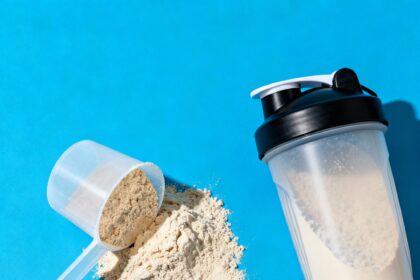By Sebastian Moncayo
Why Carbohydrates Matter
For athletic performance, the macronutrient that typically receives the most attention is protein, and with good reason. However, carbohydrates can be just as crucial as protein for optimal training performance.
Yet, lately, carbohydrates have been getting quite a bad rap as people are becoming much more hesitant about their intake. Understanding their function and how increased consumption with the right strategies may lead to improved athletic performance might start changing this idea.
How the Body Uses Carbohydrates
First, it’s essential to understand how the body uses carbohydrates. When we consume carbohydrates, our body converts them to glucose which is stored in our muscles and liver as glycogen. This produces Adenosine TriPhosphate (ATP), the body’s preferred source of energy.

ATP and Glycolysis
ATP is derived from glycogen through a series of chemical reactions known as anaerobic (no oxygen required) glycolysis. Glycolysis is responsible for most of the ATP production needed for muscle contractions in high intensity-low duration efforts typically lasting 30-180 seconds such as sprints or weightlifting PRs.
However, as glycogen stores deplete, muscle performance decreases. Hydrogen ions and lactate build up in our system as waste by-products of the energy reaction, making the body more acidic and leading to fatigue. Then the body transitions into aerobic (oxygen-required) systems to continue fueling the muscles with ATP.
Carbohydrates and Diet Trends
This demonstrates how vital carbohydrates are in athletic performance. The human body relies on carbs to fuel muscle contractions for short maximum efforts. Recently, “cutting carbs” has become a common practice with the idea that excessive carbohydrate consumption leads to weight gain.
This may be partially attributed to the popularity of diets promoting low-carbohydrate consumption, such as the ketogenic diet. The “keto diet” claims to induce weight loss by forcing the body to burn more fat for energy rather than carbs.
According to a 2022 study, even though this diet can be effective for obese individuals under supervision, for the slightly overweight or weekend warrior looking to lose weight, there is minimal benefit. There is little difference in the weight lost between individuals following a low-carb diet and a balanced carb intake.
Regarding optimal training performance, carbohydrate restriction based on the idea that high consumption of carbohydrates may induce weight gain is simply flawed. Excess calories and a sedentary lifestyle are much more likely to cause weight gain.
Carbs as a Primary Energy Source
So, if carbs are the primary source of energy for the human body in the form of glycogen and glucose, would it not be ideal to consume high glycogen levels to increase training adaptations? Carbs become the primary energy substrate when exercising at high intensities, and glycogen depletion is considered a critical limiting factor in performance, according to a 2019 paper. This is especially true for high-intensity exercise.
Carbs and Training Adaptations
The ingestion of carbohydrates can increase glycogen levels in the body, allowing training to be performed at a higher intensity for longer periods without fatigue. But glycogen doesn’t only play a role in preventing fatigue; it also serves as a regulator of the signaling pathways that control adaptations in response to training. Intake can influence exercise adaptations.
Quality of Carbohydrates
Not all carbs are created equal. Consuming carbs from whole grains is not the same as deriving it from ice cream. Therefore, it’s essential to emphasize the right carbohydrates such as whole grains, fruits, vegetables, and legumes which are rich in nutrients that are beneficial to the body.
Timing and Periodization
The timing and amount of ingested carbohydrates may also play a role in efficacy. Individual periodization should be managed based on the intensity of the workload. A good rule of thumb is either consuming greater amounts of carbohydrates on the days before competition, or ingesting a simple, fast-digesting carb (bananas, for example) immediately before or during exercise to increase ATP production and supply.
Increasing carbohydrate consumption can lead to an increase in glycogen stores and ATP production. This allows training to be performed at higher intensity while resisting fatigue.
Glycogen Loading and Training Adaptations
Timing and periodization play key roles in carbohydrate efficacy relating to performance enhancement. A well-known sports conditioning concept known as glycogen loading is important. The idea behind glycogen loading is the body needs to have high levels of glycogen before a competition to maximize performance.
Generally, athletes incorporate high amounts of carbs in their diet one week before their competition to increase glycogen levels and offset fatigue. However, this can vary. A 2018 study subjected rats to a high carbohydrate diet and specific exercise conditions to measure if there was an increase in their glycogen levels. The results showed a rise in brain and muscle glycogen but not as much in the liver. This suggested that glycogen loading effectively increased muscle glycogen levels more than liver glycogen.

Carbohydrate Timing Before, During, and After Exercise
Another vital factor is timing before, during, or after exercise. Consuming the right amount of carbohydrates an hour or two before a workout (typically 1-4g per kg of body weight) can enhance performance in training sessions longer than 50 min.
During Exercise
During exercise glycogen is being depleted. Eating some fast-digesting carbs during a session may attenuate depletion, allowing for sustained higher intensities.
Post-Exercise Recovery
Consuming carbs after a session along with protein stimulates protein synthesis and glycogen re-synthesis to enhance training adaptations and performance.
Summary
Carbohydrates are the body’s preferred energy source. By turning into glucose and being stored in the muscle and liver as glycogen, they fuel muscle contractions during high-intensity training. As glycogen levels deplete, fatigue increases. Even though carbs have been linked to weight gain, a carbohydrate-rich diet, along with proper training, can enhance athletic performance. Minor strategies like glycogen loading or mid-session carb intake can significantly improve results.
References
Bytomski J. R. (2018). Fueling for Performance. Sports health, 10(1), 47–53. https://www.ncbi.nlm.nih.gov/pmc/articles/PMC5753973/
Cholewa M. Jason, Newmire E. Daniel, Zanchi E. Nelo. (2019). Carbohydrate restriction: Friend or foe of resistance-based exercise performance? Nutrition Volume 6, 136-146. https://www.sciencedirect.com/science/article/pii/S0899900718309535
Mata, F., Valenzuela, P. L., Gimenez, J., Tur, C., Ferreria, D., Domínguez, R., Sanchez-Oliver, A. J., & Martínez Sanz, J. M. (2019). Carbohydrate Availability and Physical Performance: Physiological Overview and Practical Recommendations. Nutrients, 11(5), 1084. https://www.ncbi.nlm.nih.gov/pmc/articles/PMC6566225/
Naude, C. E., Brand, A., Schoonees, A., Nguyen, K. A., Chaplin, M., & Volmink, J. (2022). Low-carbohydrate versus balanced-carbohydrate diets for reducing weight and cardiovascular risk. The Cochrane database of systematic reviews, 1(1), CD013334. https://www.ncbi.nlm.nih.gov/pmc/articles/PMC8795871/
Soya, M., Matsui, T., Shima, T., Jesmin, S., Omi, N., & Soya, H. (2018). Hyper-hippocampal glycogen induced by glycogen loading with exhaustive exercise. Scientific reports, 8(1), 1285. https://www.ncbi.nlm.nih.gov/pmc/articles/PMC5775355/







































